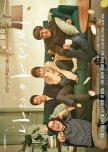
My Mister – A Masterpiece Etched in Silence and Sorrow
There are stories that entertain, stories that move, and then there are stories that change you. My Mister isn’t just a drama—it’s an experience, a deep, soul-wrenching journey that lingers long after the credits roll. It doesn’t rely on grand gestures or melodramatic flair to tell its story. Instead, it thrives in the mundane, the quiet, and the unspoken, proving that sometimes, the softest whispers echo the loudest.At its core, My Mister is a story of two people drowning in life’s weight, finding an unlikely connection that neither romanticizes nor simplifies their pain. Park Dong-hoon (Lee Sun-kyun) is a man in his forties, suffocating under the sheer gravity of existence—trapped in an unfulfilling marriage, burdened by family responsibilities, and slowly eroded by the small betrayals of everyday life. Lee Ji-an (IU) is a young woman who has never known warmth, scraping through survival in a world that has shown her nothing but cruelty. Their bond isn’t one of passion or romance, but something far more profound—recognition. A silent acknowledgment of shared loneliness, of a mutual understanding that transcends words.
Many dramas rely on explosive confrontations and grand resolutions to convey emotions. My Mister does the opposite. It lets pain settle in the spaces between dialogue, in the weary sighs, in the exhausted way Dong-hoon trudges through life, in the hollow yet defiant way Ji-an stares at the world. It’s a symphony of restraint, where every pause, every stolen glance, every half-smile screams louder than words ever could.
Lee Sun-kyun delivers a masterclass in quiet devastation. He embodies Dong-hoon as a man who has been beaten down by life but refuses to break, holding onto his decency like a life raft. His every movement is heavy with exhaustion, his rare moments of joy fragile yet radiant. There’s no dramatic breakdown, no theatrical outburst—just a man enduring, because that’s all he knows how to do. Then there’s IU. This is the performance that shattered every preconception about her as an actress. As Ji-an, she is a ghost of a girl, worn thin by hardship, navigating life with a survivalist instinct that leaves no room for softness. Her eyes—hollow, unreadable, yet brimming with unspoken emotion—do most of the acting. When Ji-an finally allows herself to feel, even if just for a second, it’s like watching the first cracks in a dam before the flood. Their connection is so profound because it isn’t forced. There is no “saving” each other. No grand promises of happiness. Just two broken people walking the same dark road, offering the smallest flicker of light.
But My Mister isn’t just about Dong-hoon and Ji-an—it’s about all the people weighed down by life’s burdens. Dong-hoon’s brothers, endlessly flawed yet deeply human. His colleagues, wrapped in office politics and petty betrayals. The neighborhood ahjummas, the struggling bar owner, even the antagonists—all of them feel like real people with real struggles. There are no caricatures, no villains twirling their mustaches. Just people, messy and imperfect, trying their best. Even Dong-hoon’s wife, whose betrayal could have been written as a one-dimensional act of villainy, is given depth. Her actions are painful, yes, but never cartoonish. Like everyone else, she is just a product of her own loneliness.
One of the most stunning aspects of My Mister is its use of subtext. This isn’t a drama that spells things out for you—it lets you observe, feel, and piece things together yourself. It respects its audience’s intelligence, layering its story with nuance that rewards attentive viewers. Dong-hoon and Ji-an’s conversations are often not about what they’re actually about. Their silences hold more weight than entire monologues in lesser dramas. And through it all, the drama asks: What does it mean to survive? Not just physically, but emotionally. How much pain can a person carry before they collapse? And if they do, is there anyone there to catch them?
The soundtrack of My Mister is a quiet storm—melancholic, haunting, yet strangely comforting. Sondia’s Grown-Ups lingers like an ache in the chest, a song that perfectly encapsulates the bittersweet weight of growing older, of carrying wounds no one else can see. The music isn’t just accompaniment—it is the very breath of the drama, weaving through its most powerful moments like an invisible thread tying everything together.
If My Mister has a flaw, it’s its pacing. It is slow, deliberate, demanding patience. But calling this a flaw feels almost wrong—because this isn’t a story that can be rushed. It is a sunrise, not a firework. If you’re waiting for grand payoffs or dramatic showdowns, you won’t find them here. But if you give it time, if you let it settle into your bones, My Mister will change you.
Verdict: The term “masterpiece” is thrown around far too often, but if there’s one drama that earns it in its purest form, it’s My Mister. It isn’t just about pain—it’s about the resilience to endure it. It isn’t about grand, sweeping love—it’s about the small, quiet kindnesses that keep us going. This isn’t just storytelling. This is life, captured in its rawest, most beautiful form.
Final Score: 10/10
A once-in-a-lifetime drama that doesn’t just set a standard—it defines one.

The Sageuk That Cooked, and We Ate Well
Bon Appétit, Your Majesty is a rare feast — a romcom sageuk that knows exactly what kind of dish it’s serving and seasons every bite with care, humor, and heart. What could’ve been just another time-slip fantasy becomes something richer: a story about how kindness, trust, and food can heal the wounds that power and pride often deepen.At the heart of the story is Ji-yeong (Im Yoon-ah), a modern-day chef who wakes up in the Joseon palace kitchen, and Yi-hyeon (Lee Chae-min), the cold, volatile king carrying a heart full of grief. Their relationship isn’t built on fate or magic, but through meals — each dish becoming a quiet act of care that chips away at his loneliness. What makes the drama stand out is its refusal to exaggerate. It doesn’t need shouting matches or tragic flashbacks to make us feel; it lets simmering emotions do the heavy lifting.
Visually, the series is stunning. Every frame feels like a painting — sunlight cascading over lacquered wood, steam curling in the cold dawn air, and food shot with reverence worthy of a temple offering. The color palette mirrors the story’s tone shifts: warm, golden hues during the kitchen’s laughter-filled scenes, deep shadows when rebellion brews. It’s one of the rare sageuks where visual storytelling alone could carry the plot — you can practically taste the story unfolding.
The sound design deserves just as much praise. This is not a show that relies on its OST alone — it’s a sound-driven experience. The sear of meat, the rhythmic chop of knives, and the hiss of torches become their own language of intimacy. The OST complements rather than competes: I Find You by Doyoung and Stay With Me by Huh Gak highlight the drama’s melancholic heartbeat, while By Chance, By Fate and Kung add warmth and longing in quieter moments. Netflix’s subtitle team also deserves credit for sharp, era-bridging translations that preserve the humor and nuance (“almond/all mend” still makes me grin).
Of course, no meal is perfect. The finale’s “it’s a secret” twist lightly flirts with deus ex machina territory, and the last two episodes compress a little too much narrative into a short runtime. Yet, these are minor seasoning imbalances in an otherwise perfectly cooked dish. The heart of the story never falters.
What truly anchors Bon Appétit, Your Majesty is its emotional thesis: compassion as the highest form of love. Ji-yeong doesn’t save Yi-hyeon through logic or miracles — she feeds him. Each act of cooking becomes a rebellion against cruelty, a declaration that tenderness has power too. When she tells him, “Your pain is my pain, Your Majesty,” it’s not romantic fantasy; it’s empathy distilled into its purest form.
Both leads are magnificent. Im Yoon-ah reclaims her romcom crown, bringing both humor and quiet strength to Ji-yeong. Lee Chae-min, meanwhile, delivers a performance that cements him among sageuk elites — his emotional restraint, his rage, his breaking point — all feel painfully real. His portrayal of a king learning to be human again might just be one of the best performances of the year.
In the end, Bon Appétit, Your Majesty upholds the romcom covenant flawlessly: it makes you laugh, ache, and care deeply. It’s not just a story about cooking — it’s a meditation on nourishment, forgiveness, and trust. It reminds us that love isn’t always about grand gestures; sometimes, it’s just about making sure the other person eats well.

Tradition, Terror, and the Unseen Forces of Exhuma
Some movies don’t just tell stories—they pull you into an experience, shaking your senses and making you question the veil between the known and the unknown. Exhuma does exactly that, weaving a rich tapestry of horror, mysticism, and history in a way that lingers long after the credits roll. Unlike your typical horror flick, which thrives on predictable jump scares and cheap thrills, Exhuma chooses a more refined approach, delivering terror through atmosphere, silence, and a masterful understanding of unseen horrors. It’s not just a ghost story; it’s a chilling excavation of Korea’s spiritual traditions, its historical scars, and the eerie consequences of disturbing what should have been left untouched.At its core, Exhuma follows a wealthy family in Los Angeles plagued by supernatural disturbances. Enter Hwa-rim (Kim Go-eun), a powerful young Mudang (shaman), and her apprentice Bong-gil (Lee Do-hyun). Their investigation leads them back to Korea, where they seek the expertise of renowned geomancer Sang-deok (Choi Min-sik) and undertaker Young-Geun (Yu Hae-jin). The cause of the disturbances? A family ancestor buried in a sinister location—one that calls out to the living with a phenomenon known as “Grave Calling.” When they unearth the burial site, they unknowingly unleash something far more malevolent than they ever anticipated.
What sets Exhuma apart is its ability to balance the ancient with the modern, creating a hypnotic dance between Korea’s deep-rooted shamanistic beliefs and the stark rationality of contemporary society. This clash of old and new is most evident in the contrast between the Mudang and the Onmyoji. While both are spiritual practitioners, the Mudang primarily focuses on appeasement and harmony—guiding spirits to peace and offering rituals of reconciliation. Onmyoji, on the other hand, stems from Japan’s esoteric cosmology and leans more toward exorcism, banishment, and, at times, the deliberate use of curses. Understanding this difference adds an extra layer of depth to Exhuma, as the film subtly critiques Korea’s historical subjugation under Japanese rule. It’s not just about spirits and graves—it’s about cultural erasure, the lingering effects of colonization, and reclaiming what was lost.
Visually, Exhuma is a masterclass in horror cinematography. It plays with darkness and reflections in ways that feel disturbingly intimate, leaving the audience constantly on edge. Spirits are never thrown at the screen with dramatic musical stingers; they appear briefly in mirrors, in the corner of a frame, or in the sheen of a polished surface. There’s no build-up to warn you—they simply exist, making their presence feel eerily close. The film’s use of muted tones and sudden bursts of fiery red further accentuates the contrast between tranquility and rage, peace and vengeance. And the sound design? Absolutely stellar. It understands the power of silence, allowing tension to creep in organically, punctuated only by the rhythmic chants and sharp percussions of Mudang rituals.
Kim Go-eun’s performance as Hwa-rim is nothing short of mesmerizing. She completely disappears into her role, embodying the essence of a Mudang with haunting authenticity. Her ritual dances are hypnotic, her presence commanding, and there’s an intensity in her eyes that makes it impossible to look away. There’s even a bit of chilling trivia—after one particularly powerful shamanic ritual scene, the production team reportedly brought in a real-life shaman to counteract any unintended spiritual disturbances. That’s the level of immersion we’re talking about. Lee Do-hyun, playing her apprentice, impresses with his ability to seamlessly shift between his normal self and moments of possession, making his transformation utterly believable. Meanwhile, Choi Min-sik and Yu Hae-jin bring a grounded gravitas to the film, rounding out a phenomenal ensemble cast.
But for all its brilliance, Exhuma isn’t without flaws. Its first half is near-perfect, utilizing psychological terror in a way that keeps you at the edge of your seat, never quite sure if what you’re seeing is real or imagined. The second half, however, takes a slight tonal shift, moving from eerie atmospheric horror to a more conventional “face-the-demon” climax. While this progression makes sense narratively, the transition feels a bit abrupt, and some might find the direct confrontation with evil less effective than the earlier subtle scares. That said, it never derails the film’s impact, only slightly altering its flavor.
Another potential hurdle is the film’s reliance on occult themes deeply rooted in Korean and Japanese culture. For international audiences unfamiliar with the historical and spiritual context, some nuances may be lost. But even without that background knowledge, Exhuma still manages to captivate, which speaks volumes about its execution.
Ultimately, Exhuma is more than just a horror film—it’s a love letter to Korea’s shamanistic heritage, a critique of historical injustices, and a meticulously crafted exploration of fear, both seen and unseen. It doesn’t just aim to scare you; it aims to make you think, to make you feel the weight of generations past pressing against the present. It’s unsettling, awe-inspiring, and, by the end, oddly enlightening. If you have even the slightest interest in the occult, in history, or in horror that goes beyond cheap thrills, Exhuma is an absolute must-watch.
Score: 8.5/10 - Great, Worth Watching 🔥
Strong performances, engaging storytelling, and solid execution. Maybe a few flaws here and there, but overall, a drama that delivers and is worth the time.
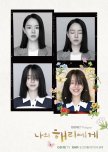
Dear Hyeri: A Disaster Redeemed Only by Shin Hye-sun’s Brilliance
Every so often, a K-drama arrives like a glittering promise, armed with all the ingredients to create something unforgettable. Dear Hyeri had them all—an intriguing premise rooted in mental health struggles, a leading actress in Shin Hye-sun known for her nuanced, soul-deep performances, and a director with enough pedigree to spin gold from good intentions.But what we got instead was fool’s gold. Pretty from a distance, but the moment you draw closer, the flaws crack wide open like fault lines. What could have been a masterpiece ends up as something you can only admire from afar, like a painting smeared over by clumsy hands.
And yet, even in the chaos of that messy canvas, Shin Hye-sun shines like a beacon. As Joo Eun-ho, a news announcer fractured by trauma and societal indifference, she threads her performance with an aching tenderness and fire so tangible it feels like it could light a dark room. When she slips into her alter ego, Hye-ri, she radiates with a childlike vibrancy and warmth. Watching her perform is like seeing a virtuoso play a symphony while the orchestra behind her fumbles with their instruments. It’s breathtaking and infuriating all at once.
If only the writing had been worthy of her brilliance.
Instead, the script falters and flails, stumbling over its own ambition. What begins as a promising exploration of mental illness, emotional scars, and fractured relationships quickly devolves into a toxic romance that stifles any potential for genuine healing or growth. It’s as if the writers were handed a Stradivarius and chose to beat it against a rock.
Jung Hyun-oh, played by Lee Jin-wook, is meant to be a complicated love interest with his own set of emotional wounds. In reality, he’s about as engaging as a brick wall. His character is controlling, possessive, and somehow painted as romantic. For a man who supposedly broke Eun-ho’s heart with a brutal breakup that shattered her psyche, his return to her life feels less like a redemption arc and more like an unwanted guest barging through the front door. Lee Jin-wook’s performance doesn’t help matters—his delivery is as flat as week-old soda, all fizz gone with nothing but a bitter aftertaste.
What makes this dynamic even more unbearable is the deeply toxic nature of their relationship. Hyun-oh’s character is controlling, prone to jealousy, and perpetually invasive. Let us not forget that his decision to end their eight-year relationship was the catalyst for Eun-ho’s mental breakdown. And yet, he has the audacity to reinsert himself into her life under the guise of concern, all while displaying the emotional maturity of a teenager. The script’s insistence on portraying this relationship as redemptive or romantic is not just misguided; it’s outright insulting to the audience’s intelligence.
As if the main romance weren’t enough of a travesty, the plot’s resolutions are equally asinine. After endless episodes of Eun-ho struggling to reclaim her agency and vowing not to repeat past mistakes, she inexplicably returns to Hyun-oh, who—miraculously and without justification—is suddenly ready for marriage. It’s the kind of narrative sleight-of-hand that leaves viewers questioning whether the writers were as emotionally invested in these characters as they expected us to be.
The supporting cast offers some reprieve, albeit not enough to salvage the series. Kang Hoon’s portrayal of Kang Ju-yeon, the secondary romantic lead, is magnetic. His understated performance imbues the character with depth and vulnerability, and his interactions with Hye-ri provide some of the show’s most heartfelt moments. Similarly, Jo Hye-joo’s turn as Baek Hye-yeon is a breath of fresh air. Her character’s bright, comedic energy and genuine warmth often overshadow the main storyline, to the point where her romance with Ju-yeon becomes infinitely more engaging than the supposed central plot. If only the drama had leaned into this secondary storyline more—perhaps it could have salvaged some dignity.
Instead, we are subjected to some of the most aggravating side characters ever to grace the small screen. Yoon Joo-man’s portrayal of Jeon Jae-yong, a returning veteran reporter, is particularly egregious. Meant to provide comic relief, his antics are neither amusing nor endearing. Rather, they are a masterclass in how to derail a scene and test the viewer’s patience. It’s as though the writers were determined to pad the runtime with filler material, no matter how irritating or inconsequential.
Ultimately, the blame lies at the feet of screenwriter Han Ga-ram, who fumbled an intricate premise with the grace of a clumsy juggler. What could have been a deep dive into trauma and recovery instead feels like a soap opera with none of the satisfying melodrama. The tonal inconsistency leaves viewers adrift, struggling to latch onto a story that seems unsure of its own identity.
And yet, there is Shin Hye-sun. Steady, luminous, and unflinchingly present. Watching her navigate this mess of a script is like witnessing an artist paint masterpieces on scraps of torn paper. Her brilliance is the only thing that keeps Dear Hyeri from collapsing entirely under the weight of its own failings.
Dear Hyeri is a masterclass in how to waste potential. It is a drama that promised depth but delivered shallowness, that teased complexity but settled for clichés. For Shin Hye-sun fans, it is a painful reminder of what happens when a luminous star is forced to shine in a black hole of mediocrity. For everyone else, it is a cautionary tale: not all that glitters is gold.
Verdict: Dear Hyeri had the potential to be a riveting character study, but instead, it buckles under the strain of its clumsy writing and misplaced priorities. Shin Hye-sun’s performance is a diamond buried in the wreckage—radiant, invaluable, but ultimately wasted on a drama that didn’t deserve her.. For Shin Hye-sun’s sake, let us hope her next project is worthy of her immense talent.
Score: 5/10
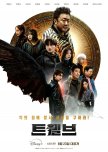
Star Power Can’t Save Twelve From Becoming a Black Hole of Boredom
Did… did they just blow the entire budget on the actors’ fees and leave nothing for production or writing? Because I’m genuinely flabbergasted at how Twelve managed to fumble so catastrophically when its premise practically wrote itself.This is a high fantasy Kdrama about the twelve Chinese Zodiac signs living as humans to battle a literal devil, played by none other than Park Hyung-sik. Let me repeat that: Park Hyung-sik, with all his charisma and range, is cast as the ultimate villain — and somehow the show still manages to be mind-numbingly dull. That’s not just wasted potential; that’s malpractice.
On paper, this premise should be unstoppable. It’s epic. It’s mythic. It’s the kind of setup that demands spectacle, rich worldbuilding, and pulse-quickening stakes. Instead, what we get is the narrative equivalent of lukewarm soup: bland, watery, and inexplicably boring.
And boring is the biggest crime of all.
Fantasy doesn’t have the luxury of being dull. Slice-of-life dramas can coast on vibes; fantasy needs momentum and awe. Twelve delivers neither. Two episodes in, and I’m not even remotely hooked. That’s a red flag for an 8-episode series, when you’ve already burned 25% of your runtime and still can’t convince me to care, it’s over.
The pain stings sharper because of the star-studded cast. You don’t assemble names like this and then wrap it in what feels like a film student’s summer project. That’s the vibe here: all the gloss of big casting announcements, but the execution of something thrown together on a shoestring, hoping the actors’ charisma alone would carry it. It’s jarring, like watching A-list actors perform Shakespeare in a high school gym with folding chairs for props.
Even the supposed central hook (Zodiac warriors versus the Devil) feels smothered under bad pacing and directionless storytelling. When your audience is asking by episode two, “Wait, are we getting pranked?” you’ve lost the plot. Literally.
I went into Twelve hyped, expecting a late-summer action fantasy to sink my teeth into. Instead, I’m left gnawing on disappointment. The production feels cheap, the writing lifeless, and the direction uninspired. It’s the uncanny valley of K-dramas: all the big pieces are there, but the soul is missing.
To put it bluntly, Twelve is such a mess it somehow made The 8th Show look like Citizen Kane. And that’s saying something, because The 8th Show was my first and only 1/10 drama. Yet compared to this, even The 8th Show feels like it at least tried to be something. Twelve is just… there. A hollow shell of what could have been, a drama so devoid of energy it manages to turn Park Hyung-sik’s devil into a snore.
If the devil in Twelve is supposed to represent ultimate evil, then maybe the real villain here is X+U Studio, for daring to waste this cast, this premise, and my time.
Final verdict: Twelve is proof that not all star-studded fantasies are worth chasing. Sometimes, the constellation is nothing but burned-out stars.
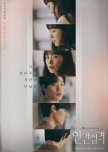
Lost: The Quiet Collapse of a Drama That Could’ve Been Great
In a sea of K-dramas trying to outdo one another with grand gestures, heart-fluttering tropes, and tearjerking orchestral swells, "Lost" dares to whisper instead of scream. It’s not a drama that asks for your attention—it quietly waits for you to notice it, like a painting hanging in a dim hallway, revealing its details only to those who stop and stare long enough. And for the most part, the patience pays off. But sometimes, the hallway’s too dark."Lost" is a beautifully bleak tale of two people at the edge—of youth, of hope, of the invisible line that separates "existing" from "living." At forty, Lee Bu-jeong (played by Jeon Do-yeon) is adrift, her once-promising literary future buried under layers of emotional debris. Kang-jae (Ryu Jun-yeol), at twenty-seven, is technically still young, but already watching the clock run out on dreams that never had a real chance. The plot promises a slow descent into introspection, but what it delivers is closer to an emotional Rorschach test—you’ll either see something profound, or nothing at all.
Visually, the drama is nothing short of a masterpiece. Every frame is carefully composed like a photograph hung in an art gallery. Lighting becomes its own character, especially during the night scenes, which glow with such purposeful brightness they feel like metaphors for trying to find clarity in the dark. The stargazing scene is so breathtakingly framed, it nearly convinces you that you’re witnessing something holy. Unfortunately, the audio fails to match the visual splendor. Aside from the haunting use of Jeff Buckley’s "Hallelujah," the rest of the OSTs feel like an afterthought. Serviceable, yes, but utterly forgettable. It’s like wearing a designer suit and pairing it with gym socks.
The casting is equally ambitious. Ryu Jun-yeol and Jeon Do-yeon give individual performances that deserve standing ovations—when they’re apart. Together, they’re like oil and water that someone tried to mix with a spoon and gave up halfway. There’s no chemistry, no magnetism, no sense of inevitable collision that makes slow-burn romances worth the wait. But perhaps that was the point. Because here’s where the drama gets sneaky. Bu-jeong, for all her central placement in the story, feels like she was written to be disliked. She is a character-shaped void. Her depression is unexplained, her actions unjustified, her emotional infidelity irritating. And yet, what if that’s the point? What if Bu-jeong isn’t the protagonist, but the black hole around which the real stars revolve?
Because to talk about its emotional impact, we must talk about its emotional absence. Bu-jeong. Oh, Bu-jeong. She's the emotional equivalent of a black hole—every feeling thrown at her gets swallowed, never to be seen again. And it’s tempting to write her off as a poorly written character, an exhausting cipher who walks around like a permanent sigh. But if you look closer, there's a method in the melancholy. Her emotional unavailability isn’t a bug; it’s the feature. The writer didn’t want you to root for her. They wanted you to recoil. Her selfishness, her detachment, her emotional infidelity—they are framed deliberately, not as flaws to forgive, but as voids that highlight the light around her. She is not the flame; she is the darkness that makes other candles visible.
Enter Kang Min-jung (Son Na-eun) and Lee Sun-joo (Yoo Soo-bin). If Bu-jeong is a door permanently ajar to an empty room, these two are a window flung open to spring air. Their chemistry is instant and sparkling, like champagne fizzing over the brim. Son Na-eun’s ability to be mischievous without being cheap is remarkable, and Yoo Soo-bin plays the flustered golden retriever with such sincerity you want to pat his head and hand him a snack. Their scenes feel like little stolen moments from a completely different drama—one that decided not to punish its audience for wanting warmth. When their love finally blooms in a beautifully underplayed exchange about spending money together, it feels more intimate than any dramatic “I love you.” She wasn’t asking him to save her; she was asking if they could build something together. It was romantic in the way real love is romantic—quiet, mutual, and rooted in the mundane.
Kang Min-jung and Lee Sun-joo don’t just steal the show—they commit a full emotional heist. Their chemistry is electric in the most grounded way. She flirts with a glint in her eye that could topple empires, and he responds with the kind of wholesome panic that makes your heart squeeze. Their arc turns from casual banter to soul-wrenching vulnerability in such an organic flow that you forget you were watching a tragedy. Their final confession isn't even a confession—it's a proposal masked as a question: "Do you want to build a life together?" It doesn’t use the words "I love you," because it doesn’t need to. Every syllable between them already screamed it.
Oddly enough, the same can be said for Bu-jeong’s husband, Jin Jung-soo (Park Byung-eun), and his ex, Kyung Eun (Kim Hyo-jin). Their rekindled connection carries more emotional weight than the central pairing. The drama gives them a full backstory, moments of honesty, and a kiss that feels justified rather than scandalous. While Bu-jeong’s silence suffocates, Jung-soo and Kyung Eun’s pain is laid bare. You may not agree with their choices, but at least you understand them.
The irony is that in a drama built around Bu-jeong’s emotional descent, the heart of the story lies in the warmth of its side characters. Park Byung-eun’s portrayal of Bu-jeong’s husband, Jin Jung-soo, deserves its own quiet applause. He tries—really tries—to reach her across the chasm she’s dug between them. When he reconnects with his ex, it doesn’t feel like cheating; it feels like survival. Their kiss lands with context, history, and emotional symmetry. It’s a moment of two people reaching back for the versions of themselves that knew how to feel.
Which brings us to the elephant in the room: Bu-jeong. If her character wasn’t intended as a vessel of emotional void, then this is simply one of the worst-written leads in recent memory. For fifteen episodes, she sulks, avoids, and alienates. Her pain is shown, not explained. We’re told she’s suffering, but never given the tools to care. This isn’t emotional mystery; it’s emotional hostage-taking. By the time the curtain starts to lift on her backstory, it’s too late—we’ve moved on, emotionally adopted Kang Min-jung and Sun-joo, and stopped checking in on Bu-jeong altogether. We’re done unpacking her suitcase when we don’t even know what she’s running from.
Supporting characters orbit in and out of the narrative with varying degrees of success. Bu-jeong’s father (played with gentle charm by Park In-hwan) provides some of the most quietly touching moments. His relationship with his daughter and son-in-law hints at the love languages we forget: patience, shared silence, and small acts of grace. But aside from him, most supporting characters feel like background extras in a dream you’re only half-invested in. Unlike My Mister, where every character etched themselves into your memory, Lost lets most of its side cast fade into static.
The show’s slowburn structure isn’t inherently flawed. Many great dramas tread gently. But Lost mistakes withholding for depth. Pain without context isn’t profound—it’s just tiring. And while some viewers may appreciate the ambiguity, others will find themselves yelling at the screen, “Just tell us why you’re like this!” The drama leans so hard into the mystery of Bu-jeong’s suffering that it forgets to earn our empathy. It’s not that audiences can’t handle emotional weight—we just need to know what we’re carrying.
And yet, maybe it’s not a failure. It’s a contradiction. Because once you mentally sideline Bu-jeong’s character—treat her not as the protagonist but as the black backdrop to highlight the color—Lost becomes a vastly more rewarding watch. The narrative reorients itself, almost as if by accident, into something hopeful in its quiet subplots. Love, however tentative. Connection, however fragile. It’s a mosaic built from broken tiles, and sometimes, you just have to stop trying to fix it to see the beauty.
Ironically, what saves Lost from itself is everything around the central plot. The blooming love between Min-jung and Sun-joo. The quiet heartbreak of a husband who tried too long. The accidental beauty of side characters who briefly flicker to life. These moments paint the grayscale world of Lost with unexpected color. And in doing so, they unintentionally make Bu-jeong’s void even more frustrating.
Verdict:
Lost is a drama that dares to be disliked, dares to be uncomfortable, and somehow finds meaning in the emotional wreckage it leaves behind. It’s not for everyone. But for those willing to dig through its shadows, it offers small, hard-won glimmers of light—and sometimes, that’s enough. It starts as a quiet meditation on loneliness and disillusionment but ends up getting lost in its own fog. Depending on how you frame it, it could be either a genius piece of subversive writing or a case study in wasted potential. But one thing is clear: if you erase Bu-jeong’s storyline and focus solely on the supporting narratives, there’s a rich, emotionally rewarding drama hidden within. Take that however you will.
Final score: 5/10, generously buoyed by the delightfully warm story of Kang Min-jung and Lee Sun-joo, who deserve their own spin-off and all the sunshine that Bu-jeong refused to let in.

This KDrama Is Bullshit; Yet Another One with Potential being Destroyed by Disney Plus.
I wanted to love this drama. And for the first few episodes, I did. The Murky Stream starts strong — hellishly strong. The world-building, the morally complex characters, and the interweaving of three separate but connected storylines immediately pull you in. Si-yool’s tragic fall from a promising scholar to a fugitive forced into moral compromise is gripping. Choi Eun’s principled defiance against corruption makes her a heroine you root for instantly. And Jung Cheon’s idealistic struggle to reform a rotten system from within adds a sense of urgency and moral weight. Together, they form what I now call the “triptych of justice” — three perspectives on morality and survival, each compelling in its own right.Rowoon’s performance as Si-yool is phenomenal — restrained rage that threatens to boil over, his every glance and movement telling volumes. The acting is as tight as the writing in those early episodes, and for a moment, it felt like we were watching a masterclass in character-driven historical drama.
And then… the final episode. Or, more accurately, the non-final episode. The story is left hanging, incomplete, clearly set up for the next season — a season that is not promised, only dangled as bait. Let me be clear: this is not a stylistic choice, this is corporate greed masquerading as storytelling. I watch K-dramas because the stories are complete. They are self-contained, satisfying, and deliberate. You can invest in them fully, knowing the narrative arc will reach its conclusion. That’s the whole point. The Murky Stream tears that away in a single, infuriating stroke.
What could have been a tight, nine-episode gem becomes a frustrating, unsatisfying mess in the last few minutes. The “triptych of justice” — Si-yool’s compromise, Choi Eun’s defiance, Jung Cheon’s repair — never reaches closure. The moral and emotional arcs that had been meticulously crafted are left dangling, unresolved, for a future season that may never do them justice.
I have no interest in continuing with Disney+ or any of their forced multi-season “Westernized” treatments of K-drama. They’ve taken a story with precision, depth, and thematic weight, and reduced it to a subscription trap. This is not the K-drama I fell in love with — it’s a hollow, incomplete shadow of what could have been.
Started with immense promise, character-driven brilliance, and thematic depth, only to collapse under a cliffhanger that serves corporate greed rather than storytelling. Avoid if you expect a complete, satisfying narrative — exactly what K-dramas should be.
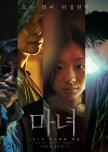
Kim Da-mi’s Breakout Carnage - The Witch’s Subversion: A Masterclass in Controlled Chaos
Some movies throw you straight into the action, but The Witch: Part 1. The Subversion does something different—it lulls you into a sense of normalcy before yanking the rug out from under you. At first, it feels like a touching story of an amnesiac girl, Ja-yoon, raised by kind farmers after a traumatic childhood incident. But then it flips the switch, transforming into an absolute bloodbath of a superpowered showdown. If you walked in expecting a slow-burn thriller, you’re in for a ride—because once this film kicks into high gear, it does not let up.What makes The Witch so compelling is how it carefully builds Ja-yoon’s world before shattering it. There’s a quiet charm in watching her navigate normal life—worrying about money, caring for her ailing mother, and even auditioning for a talent show. But then there’s that creeping feeling that something’s off. When she casually levitates a microphone on live television, it’s a moment that shifts everything. And that’s what makes this story brilliant—it plays its cards slowly, keeping the audience in suspense about what Ja-yoon is truly capable of.
Then we get to the action—oh man, the action. If the first half of the movie was a ticking time bomb, the second half is the explosion. Kim Da-mi goes from soft-spoken farm girl to cold-blooded killing machine in a way that’s both terrifying and exhilarating. The moment she reveals she never lost her memory and was in control the entire time? Absolute chills. Her transformation is flawless—one second, she’s meek and frightened, the next, she’s delivering death stares that could freeze hell over. And when she finally unleashes her full abilities, it’s one of the most beautifully choreographed action sequences I’ve seen in a long time. The stop-motion filming technique during the fight with Nobleman was mind-blowing—something I didn’t expect but absolutely loved.
Kim Da-mi carries this film on her back, effortlessly selling both sides of Ja-yoon. The naive girl playing along in the first half and the ruthless warrior in the second half feel like two different people, yet it all fits seamlessly. Her performance is nothing short of mesmerizing, and the moment that switch flips, you realize she was never the prey—she was the apex predator all along. And that final grin? Haunting.
Visually, The Witch is a feast. The cinematography is sleek, the action sequences are intense without feeling chaotic, and the use of practical effects mixed with CGI is top-tier. There’s no shyness when it comes to gore—broken bones, flying body parts, and heads literally exploding. It’s brutal, but it fits the film’s tone perfectly. This isn’t some sanitized action flick; it’s raw, visceral, and unrelenting. The final battle in the lab is easily one of the most satisfying action climaxes I’ve seen in years.
That being said, the film isn’t perfect. Even with a two-hour runtime, some plot points feel rushed. The secret organization behind Ja-yoon’s creation is barely fleshed out, and we never really understand why the project was abandoned. A little more backstory would’ve helped anchor the stakes better. And while the final act delivers in spectacle, it does feel a bit backloaded. Spreading out some of the action sequences across the film could have made for a more balanced pacing. But honestly, these are minor nitpicks in an otherwise stellar film.
Gore-sensitive viewers might find some scenes a bit too much, but for those who love hard-hitting, well-executed action, this is pure cinematic bliss. And beyond all the fights and bloodshed, there’s something surprisingly touching about Ja-yoon’s story. Despite being engineered as a living weapon, she found humanity in her adoptive parents—a warmth that kept her from becoming just another monster. It’s almost like Superman being raised by the Kents, except instead of saving cats from trees, she’s tearing through armed soldiers like paper dolls.
The Witch: Part 1 is an absolute must-watch—not just for Korean movie lovers, but for anyone who appreciates an adrenaline-fueled, well-acted, visually stunning action thriller. Park Hoon-jung took a familiar premise and turned it into something uniquely gripping, and Kim Da-mi delivered one of the most unforgettable performances in modern action cinema. And with that ending? Yeah, I’m already strapping in for Part 2.
Score: 8.5/10 - Great, Worth Watching 🔥
Strong performances, engaging storytelling, and solid execution. Maybe a few flaws here and there, but overall, a drama that delivers and is worth the time.
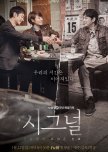
Signal: A Brilliant Transmission with a Broken Ending
In the intricate web of Korean dramas, Signal stands out as a tale both hauntingly resonant and frustratingly incomplete. Built on the foundation of cold cases inspired by real-life events, it weaves a story of connections that transcend time. However, much like the mysterious walkie-talkie that bridges its past and present, the drama itself oscillates between brilliance and bafflement, leaving viewers grappling with a sense of unease as the final credits roll.At its core, Signal is a fascinating blend of crime procedural and supernatural thriller. The narrative kicks off in 2015 when criminal profiler Park Hae-young (Lee Je-hoon) stumbles upon a discarded walkie-talkie that inexplicably connects him to Detective Lee Jae-han (Cho Jin-woong) in the 1990s. Their collaboration across time sparks the resolution of a 15-year-old kidnapping and murder case, setting the stage for a cold case team led by Detective Cha Soo-hyun (Kim Hye-soo), whose personal stakes in the mystery add layers of depth to the story. As past and present collide, the ripple effects of their actions unravel a gripping tale of justice, loss, and unintended consequences.
The drama’s initial strength lies in its narrative, which draws heavily from real-life cases such as the Hwaseong Serial Murders and the 2004 Miryang students’ gang-rape case. This grounding in reality gives Signal a chilling authenticity. Each case is a microcosm of societal failures, illuminating the devastating human toll of unresolved crimes. It’s not just the victims who suffer but also the investigators, whose lives become intertwined with the pursuit of justice.
Cho Jin-woong’s portrayal of Lee Jae-han anchors the series with his portrayal of an unyielding detective who refuses to compromise his principles despite overwhelming odds. His performance is both raw and heartfelt, making him the emotional cornerstone of the narrative. Meanwhile, Kim Hye-soo’s transformation from a naive rookie to a hardened detective showcases her remarkable range, and Lee Je-hoon’s portrayal of the hot-headed yet perceptive profiler adds a dynamic edge. The interplay between these three characters forms the heart of the drama, with each actor bringing a unique energy that complements the others. Their individual arcs are intricately woven together, creating a narrative tapestry where no thread feels extraneous.
One of Signal’s greatest strengths is its ability to deliver plot twists that genuinely surprise without feeling contrived. The writers masterfully subvert expectations, leading viewers down one path only to veer sharply in another direction, all while maintaining a logical coherence. The stakes are consistently high, and the consequences of meddling with time are explored with a level of nuance that is both thought-provoking and emotionally resonant.
Yet, for all its brilliance, Signal stumbles at the finish line. The 16th episode, a 90-minute attempt to tie up loose ends, feels like a betrayal of the meticulous storytelling that preceded it. Instead of delivering a satisfying resolution, the finale rehashes earlier scenes with minor revelations, as if circling back to the starting point without ever moving forward. The narrative comes full circle, yes, but in a way that feels more like a loop than a conclusion. The open-ended ending, clearly designed to set up a second season, is an affront to viewers who invested 15 episodes worth of emotions, only to be left dangling with no closure. Nearly a decade later, with no updates on a sequel, this decision feels all the more frustrating.
Adding to the dissatisfaction is the lack of explanation surrounding the mystical time-traveling walkie-talkie. While Signal thrives on its emotional and procedural realism, the fantastical element remains a gaping hole in the story. Hae-young’s brief theorizing about how the time magic works is brushed aside as if even the writers had no interest in delving deeper into the mechanics of their own premise. The inconsistencies in how the past and present influence each other, including the frequent “resurrections” of characters thought to be dead, undermine the emotional stakes. Why mourn a character when their death might be undone in the next episode?
Despite these flaws, Signal remains a poignant exploration of humanity and resilience. It captures the relentless determination of those who seek justice, often at great personal cost, and the ripple effects of their actions on the lives of others. The show’s portrayal of police work is unflinching in its honesty, highlighting not just the victories but also the toll it takes on those in the trenches. Some of its most powerful moments come not from the resolution of cases but from the quiet devastation of lives forever altered by violence and loss.
In the end, Signal is a tale of two halves. Up until episode 15, it is a masterclass in storytelling, character development, and emotional engagement. But its inability to stick the landing tarnishes what could have been an unequivocal masterpiece. Watching Signal is like gazing at a stunning painting, only to realize the artist left the final strokes unfinished, leaving you to imagine what might have been.
Likes:
Signal begins with a narrative punch, drawing on real-life cases to craft compelling stories that delve into the human cost of crime. The three leads—Lee Je-hoon, Kim Hye-soo, and Cho Jin-woong—deliver standout performances, creating characters who feel authentic and deeply layered. The intertwining of their arcs is seamless, with each character’s journey adding depth to the others. Unexpected plot twists keep the audience on edge, while the show’s focus on the emotional toll of its cases elevates it beyond the typical procedural drama.
Dislikes:
The final episode falters, spending too much time revisiting earlier scenes and failing to provide a satisfying resolution. The open-ended conclusion feels like a ploy for a second season, leaving viewers frustrated nearly a decade later. The mystical element of the time-traveling walkie-talkie remains underexplored, and the frequent reversals of character deaths dilute the emotional impact.
Verdict:
Signal is a gripping drama that excels in exploring the humanity behind crime and justice. Its strong performances, intricate storytelling, and emotional resonance make it a standout—up to a point. Unfortunately, the lackluster finale undermines the experience, leaving viewers yearning for closure that never comes. It’s a testament to the show’s strengths that it remains memorable despite its flaws, but one can’t help but wish it had finished as strongly as it began

The Sound of Magic – A Story That Believes in Wonder, But Not Itself
There are dramas that make you think, dramas that make you feel, and then there are dramas that ask you to believe. The Sound of Magic falls into the latter category, a visually stunning, musically enchanting tale that wants you to embrace wonder—but somewhere along the way, it forgets to fully believe in itself. Featuring a star-studded cast with Ji Chang-wook, Choi Sung-eun, and Hwang In-youp, this six-episode Netflix series is an ambitious blend of fantasy, music, and coming-of-age struggles, wrapped in a world where magic feels just within reach. But while it dazzles in moments, its story sometimes feels as fleeting as a disappearing act, leaving you mesmerized but wanting more.At its heart, The Sound of Magic follows Yoon Ah-yi (Choi Sung-eun), a struggling high school girl burdened with responsibilities far beyond her years. Living in financial hardship, abandoned by her parents, and shouldering the weight of survival, Ah-yi longs for an escape—something, anything, to lift her out of her suffocating reality. Enter Lee Eul (Ji Chang-wook), a mysterious magician who lives in an abandoned amusement park. He appears as a whisper of the impossible, asking a simple yet profound question: Do you believe in magic?
This premise alone sets up a drama filled with wonder, heartache, and existential dilemmas, and Choi Sung-eun carries it beautifully. Her performance is nothing short of mesmerizing—fragile yet resilient, lost yet yearning. She brings depth to Ah-yi, making her struggles feel raw and immediate. Hwang In-youp, playing Na Il-deung, a top student suffocating under the pressure of expectations, serves as an excellent counterbalance. While his role isn’t as fleshed out as it could have been, his portrayal of a boy learning to break free from the rigid world he knows is compelling.
Then, of course, there’s Ji Chang-wook, the heart of the fantasy, the embodiment of wonder itself. His portrayal of Lee Eul is magnetic, whimsical yet profoundly sad, as though he himself is caught between believing in magic and fearing that it might not be real. Every time he appears on screen, the drama lights up with an ethereal glow. His musical performances, particularly his duets with Choi Sung-eun, are some of the series’ most enchanting moments. There is a childlike sincerity to his portrayal—he isn’t just performing magic; he wants desperately to be believed in.
Visually, The Sound of Magic is a feast for the senses. The cinematography is breathtaking, filled with soft glows, dreamlike sequences, and intricate set designs that blur the line between reality and fantasy. The abandoned amusement park feels like a character in itself, an echo of lost dreams and forgotten wonders. Every frame is crafted with the precision of a fairy tale painting, pulling the viewer into a world that exists just slightly outside of reality.
But for all its beauty, The Sound of Magic stumbles where it matters most: its narrative. With only six episodes, the drama feels rushed and underdeveloped, as though it’s trying to weave a grand story without enough time to let its threads fully form. Important emotional beats don’t land as deeply as they should, and character arcs feel glossed over rather than deeply explored. Ah-yi and Il-deung’s struggles are set up brilliantly, but their resolutions feel abrupt, as if the story is cutting itself short just as it’s about to soar.
And then there’s the issue of the magic itself. The drama constantly asks its audience, Do you believe? But it never seems entirely sure of its own answer. Is Lee Eul truly magical, or is he just a man clinging to illusions? The ambiguity is intriguing at first but ultimately frustrating, as it leaves key questions unresolved. Instead of fully committing to its theme, the drama wavers between fantasy and reality in a way that feels more like hesitation than deliberate storytelling.
Despite these flaws, The Sound of Magic still holds undeniable moments of brilliance. The musical numbers, while not overly abundant, are beautifully integrated, offering glimpses into the characters’ souls. The emotional weight of Ah-yi’s struggles is palpable, and the drama does an excellent job of portraying the quiet desperation of youth caught between dreams and survival. Even when the storytelling falters, the performances and visuals carry the experience, making it worth watching for those willing to overlook its flaws.
Verdict: In the end, The Sound of Magic is a drama that shines brightest in moments but struggles to maintain its glow. It is a beautiful illusion, a trick of light and emotion, but one that leaves you wishing for a little more substance behind the spectacle. For those willing to embrace the fleeting nature of magic, it’s still a journey worth taking—just don’t expect all your questions to be answered when the final curtain falls.
Final Score: 7/10
A visually enchanting, emotionally touching drama that dazzles in moments but fades too soon.
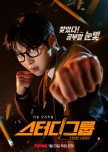
Fists, Friendship, and Finals: How Study Group Delivers a Knockout
If there were ever a drama that perfectly captured the duality of a golden retriever who turns into a direwolf when provoked, Study Group would be it. On the surface, Yun Ga-min (Hwang Min-hyun) looks like the last person you'd expect to be a fighter. With his round glasses, studious demeanor, and innocent smile, he could easily be mistaken for the quiet kid in class who always returns library books on time. But when push comes to shove—literally—he transforms into a whirlwind of fists and fury, an unstoppable force who throws down with the best of them.Study Group is a drama that blends schoolyard brawls with heartfelt aspirations, proving that even the worst high school in Korea can't crush the spirit of someone determined to rise above their circumstances. Ga-min, who desperately wants to excel in academics but is cursed with an unfortunate talent for fighting, forms a study group in a place where books are often used as weapons rather than for reading. When his friends face relentless bullying, Ga-min does what any self-respecting protagonist in an action drama would do—he throws his glasses aside, tightens his fists, and delivers one of the most exhilarating beatdowns seen in K-drama history.
What makes Study Group so enjoyable is that it never loses sight of its heart, even as it leans into its exaggerated fight sequences. Yes, we get students flying through walls, concrete floors cracking under the force of a well-placed kick, and an absurd yet beautifully choreographed display of combat. But underneath all of that is a story about resilience, friendship, and refusing to let your circumstances dictate your future. Ga-min isn’t just fighting for the sake of violence—he’s fighting for his dreams, his friends, and a future where he can finally sit in a classroom without having to dodge a punch.
One of the drama’s strongest aspects is how tightly packed it is. With each episode clocking in at around 45 minutes, there isn’t a single wasted moment. The pacing is sharp, the fight scenes are meticulously crafted, and there’s no unnecessary fluff to distract from the core story. Every battle serves a purpose, whether it’s reinforcing Ga-min’s growth or deepening the bonds between his ragtag group of misfits. There are no pointless subplots, no illogical twists—just straight-up, well-executed storytelling with a clear direction.
Hwang Min-hyun is a revelation in this role. His portrayal of Ga-min perfectly balances wide-eyed innocence with ruthless determination. He’s the kind of character you instinctively want to protect, even though he clearly doesn’t need it. His unwavering optimism and genuine desire to study, despite his dismal grades, make him all the more endearing. He’s not a traditional action hero—he’s an awkward, good-natured boy who just happens to have the ability to knock out anyone who stands in his way. It’s a contrast that works exceptionally well, making every scene with him an absolute delight.
The supporting cast also shines. Lee Han-gyeong (Han Ji-eun), the teacher who once tutored Ga-min, returns to his life as a faculty member at his school, bringing her own layers of complexity to the story. The study group members—each with their own distinct strengths and weaknesses—form a compelling ensemble that makes their bond feel genuine. From Kim Se-hyun (Lee Jong-hyun), the school’s top-ranking student who has no physical prowess, to Lee Ji-woo (Shin Soo-hyun), the judoka with a sharp tongue, everyone adds something valuable to the mix. Their camaraderie and dynamic relationships help elevate the drama beyond just its action-packed sequences.
And let’s talk about the OST—specifically, Backpacker by Seok Matthew & Park Gunwook. This high-energy rap track, with its pounding bass lines and techno influences, is unlike the usual melancholic K-drama OSTs. It’s bold, it’s aggressive, and it perfectly encapsulates the relentless energy of Study Group. The intro sequence featuring this track sets the tone brilliantly, making it impossible not to feel hyped every time it plays.
If there’s one gripe to be had, it’s that the episodes feel too short. While the tight pacing works in its favor, some plot points could have been explored in more depth. Episode 10, in particular, features one of the best fight scenes I’ve ever seen, but I couldn’t help wishing it lasted just a bit longer. However, this minor flaw is hardly enough to detract from the overall brilliance of the drama.
The best part? Study Group understands the importance of a satisfying season structure. While it leaves the door open for a sequel (which seems inevitable given the popularity of the webtoon source material), it still wraps up its first season in a way that feels complete. No frustrating cliffhangers, no unresolved storylines—just a promise of more to come, should the showrunners decide to continue Ga-min’s journey.
At the end of the day, Study Group isn’t just about throwing punches. It’s about perseverance, loyalty, and the unshakable belief that even the underdogs can carve out a future for themselves. It’s an absolute blast from start to finish, packed with heart, humor, and some of the most jaw-dropping fight scenes ever put to screen.
Honestly, any criticism I have feels like nitpicking because Study Group was simply that good. This is the most fun I’ve had with a drama since I started watching K-dramas last year. It knew exactly what kind of story it wanted to tell and delivered it with remarkable confidence and precision. Every episode was packed with tightly woven storytelling, exhilarating action, and characters that felt alive with chemistry and heart. The fight scenes—the very foundation of the drama—were masterfully choreographed, balancing raw intensity with stylish execution, making every clash feel thrilling and memorable.
Yet, what truly sets Study Group apart isn’t just the action, but its ability to infuse a surprising amount of depth and emotional weight into such a fast-paced format. The drama respected its audience, wrapping up its first season in a satisfying way while still leaving the door open for more. Hwang Min-hyun’s portrayal of Yun Ga-min was an absolute standout, making him one of the most lovable yet lethal protagonists in recent K-drama history.
Verdict:
With its perfect blend of action, humor, camaraderie, and an underdog story that hits all the right notes, Study Group has rightfully earned its spot as my Best Drama of February 2025. There’s really no need to read any more reviews—just go watch it. Absolutely, wholeheartedly recommended.
9.5/10 (and that 0.5 deduction is only because I wanted more).

History Rewritten: How Lady Ok Redefines the Joseon-Era Heroine
The Tale of Lady Ok is a drama that defied all my expectations. When I started watching, I wasn’t sure what to expect—there wasn’t much from the trailers that gave me an idea of its depth, but from the very first episode, I was hooked. What followed was an emotionally powerful, beautifully crafted story about resilience, redemption, mercy, and unwavering integrity. This drama didn’t just tell a story; it lived through its characters, bringing them to life in a way that left a profound impact.Set during the Joseon period, the drama follows Ok Tae-young, a brilliant legal advocate whose intelligence, work ethic, and courage make her beloved by the people of Cheonsu County. But she carries a dangerous secret—she was born a slave named Goo Deok, escaped her shackles, and took on the identity of a noblewoman. Her life is a precarious balancing act; one slip, and her entire existence could crumble. What makes her story so compelling isn’t just the sheer weight of the secret she carries but how she remains true to herself despite it all.
Lady Ok’s journey is nothing short of remarkable. She navigates a society that is deeply unjust, especially toward women and the lower class, and yet, she never lets bitterness consume her. Even in the face of immense cruelty, she continues to fight for justice—not just for herself, but for everyone who needs her. And that is what makes her special. Her power doesn’t come from vengeance; it comes from mercy.
One of the most moving aspects of her character is how she wins over even her enemies. Throughout the series, we watch people who once despised her, who plotted against her, slowly come to respect and even love her. This isn’t because she seeks their approval—it’s because of the unwavering integrity she embodies. Lady Ok isn’t perfect, but she never compromises on what she believes is right. That sincerity breaks down the walls of even the most hardened hearts.
A standout moment for me was how she handled the noble village chief, a man who could have easily been another tyrant to be defeated. Instead of seeking revenge, she extended mercy in a way that changed him. However, it was his wife, Lady Kim, who became one of Lady Ok’s strongest allies and defenders. As the leader of the village’s Mother’s Sanctuary, Lady Kim’s support was instrumental in Lady Ok’s journey. She not only stood by her but played a crucial role in resolving Lady Ok’s final conflict in the later episodes. Her unwavering loyalty and influence within the village ensured that Lady Ok’s fight for justice was not a solitary one, making her an indispensable part of the narrative.
The emotional depth of this drama is staggering. The final episodes were an emotional roller coaster, culminating in an ending so beautifully satisfying that I was left reflecting on it long after the credits rolled. Watching the entire community stand by her, seeing how her choices and kindness had come full circle—it was overwhelming in the best possible way.
Lim Ji-yeon’s performance as Ok Tae-young was nothing short of phenomenal. I’ll admit, I wasn’t a fan of her bully character in The Glory, but this drama has completely changed my opinion of her. She embodied Lady Ok with such grace, strength, and vulnerability that I can’t imagine anyone else playing this role. The way she switched between her personas—between Goo Deok and the noblewoman she had to become—was masterful. Every expression, every shift in tone, every moment of hesitation or resolve was delivered flawlessly.
Choo Yeong-woo, in his dual role as both Cheon Seung-hwi and Sung Yoon-gyum, was equally outstanding. The stark contrast between these two characters was brilliantly portrayed, showcasing his versatility as an actor. For someone who wasn’t widely recognized before, I have no doubt we’ll be seeing much more of him in the coming years.
The supporting cast also shone brightly. Yeon Woo’s portrayal of Cha Mi-ryeong was one of the best redemption arcs I’ve seen in a long time. Her transformation from someone blinded by vengeance to a genuinely admirable character was handled with so much care. Even the actual Lady Ok, played by Son Na-eun, left a lasting impression despite her limited screen time. Every character felt purposeful and fully realized, making their individual arcs all the more compelling.
Beyond its characters, The Tale of Lady Ok also stands out in how it breaks away from the usual palace-centered politics of traditional saeguk dramas. While there’s still plenty of scheming and maneuvering, it all takes place in the heart of the village rather than the grandeur of the royal court. This shift in setting makes everything feel more intimate and grounded. The story unfolds in a way that feels connected to real people rather than just high-ranking nobles playing power games.
Another highlight is how well-paced the drama is despite its long episodes. Each arc—Lady Ok’s arrival in Cheonsu County, her marriage into the Magister’s family, and the seven-year time skip—was fully fleshed out, giving every development the time it needed to breathe. At no point did it feel like scenes were dragged out unnecessarily.
Visually, the drama is a masterpiece. The cinematography is breathtaking, with every frame carefully composed to enhance the story. Romantic moments were especially stunning, with fireflies and moonlight creating some of the most beautifully shot love scenes I’ve seen in a K-drama. The OSTs, particularly Ailee’s DANSIMGA, added even more emotional weight to already powerful scenes. The music selection was perfect, elevating the storytelling without ever feeling overbearing.
Of course, no drama is without flaws. If I had to nitpick, I would have loved to see more courtroom scenes showcasing Lady Ok’s brilliance as a legal advocate. There was one standout full-trial scene, but I wish we had more moments like that. Additionally, Cha Mi-ryeong’s journey toward becoming a legal advocate could have been explored more. These, however, are minor criticisms in what was otherwise an exceptional drama.
Overall, The Tale of Lady Ok is an unforgettable experience. It’s not just about legal battles or revenge; it’s about hope, resilience, and the power of staying true to oneself. It shows that even in a world as cruel as Joseon, there is space for kindness, redemption, and love. Lady Ok’s story is one that will stay with me for a long, long time. This is, without a doubt, my best drama of January 2025.

A Riveting Blend of Justice and Supernatural Forces
The Judge From Hell is an enthralling Korean drama that redefines the supernatural legal genre, delivering a spellbinding mix of courtroom drama, eerie suspense, and moral introspection. At its center is Park Shin-Hye, who shines in her transformative role as a demon judge seeking justice beyond human comprehension.Set as if it's a mockery of the current Korean justice system, Park Shin-Hye’s character, an enigmatic judge with demonic powers, emerges as a relentless force balancing the scales of justice. Her duality—a merciless arbiter of punishment and a vulnerable soul burdened by her past—creates a compelling narrative anchor. The drama explores themes of redemption, vengeance, and the blurred line between good and evil.
Park Shin-Hye delivers a career-defining performance, embodying the judge’s inner turmoil and steely resolve with magnetic intensity. Her transformation scenes, where her demonic powers manifest, are breathtaking and highlight her versatility as an actress. The supporting cast complements her well, particularly her demonic teams and the lead detective who pursues her, who add layers of moral complexity and emotional depth to the story.
Visually, the drama is a masterpiece. Dark, brooding cinematography and meticulous production design transport viewers to a hauntingly beautiful world. The special effects, especially during her own trial confrontations, are both chilling and visually stunning. The soundtrack further elevates the atmosphere, blending haunting melodies with pulse-pounding beats.
However, the series does have minor flaws. Some subplots involving secondary characters feel rushed or underdeveloped, and a few episodes in the middle stretch could have been tighter in pacing. Nonetheless, the climactic episodes more than make up for these shortcomings, delivering a thrilling and emotionally satisfying conclusion.
The Judge From Hell is a bold and imaginative drama that captivates from start to finish. Park Shin-Hye’s mesmerizing performance and the show’s unique premise make it a must-watch for fans of supernatural and legal dramas alike. It’s a haunting reminder that justice doesn’t always come from above—it can rise from the depths of hell itself.

"Blood, Guts, and Heart: What Makes Trauma Code Unmissable"
Trauma Code is an adrenaline-fueled plunge into the high-stakes world of trauma surgery, balancing unflinching realism in its medical procedures with deeply human emotional storytelling. For its eight episodes, the series manages to showcase both the awe-inspiring heroism and the personal toll that come with working in a hospital’s severe trauma team. The show’s depiction of raw surgical procedures is as striking as the connections formed between the characters, crafting a unique viewing experience that is both gripping and heartfelt.At the center of this intense drama is Baek Kang-Hyuk, portrayed by the charismatic Ju Ji-hoon. Kang-Hyuk is a genius trauma surgeon with a bulldozer-like determination to save lives, even at great personal and professional cost. Ju Ji-hoon’s performance is a masterclass in balancing strength and vulnerability. Kang-Hyuk’s overwhelming confidence in his skills is tempered by his deep-seated compassion, creating a layered character who feels authentic. Ju’s nuanced portrayal of Kang-Hyuk’s struggles—such as his internalized guilt over losing patients—is both heartwarming and heartbreaking, with subtle microexpressions and gestures capturing the weight of a surgeon’s responsibilities.
The supporting cast also delivers stellar performances, each contributing to the drama’s emotional depth and dynamic storytelling. Choo Yeong-woo as Yang Jae-Won, a colorectal surgeon reluctantly pulled into the severe trauma team, delivers one of the most compelling character arcs in recent K-Drama history. Initially hesitant and reserved, Jae-Won’s transformation into a confident and capable trauma surgeon is inspiring and beautifully paced. His mentor-protégé dynamic with Kang-Hyuk is a highlight of the series, offering moments of tension, growth, and mutual respect.
Ha-young’s portrayal of Nurse Cheon Jang-Mi, a no-nonsense ICU trauma nurse, adds another layer of complexity to the team’s dynamics. Her sharp wit and unwavering focus make her an indispensable anchor during high-pressure situations. The banter between Jang-Mi and Kang-Hyuk provides much-needed comedic relief amidst the show’s intensity, while her ability to comfort younger team members, like Jae-Won, highlights her empathy and leadership. One of her standout lines, “We don’t do this for recognition or awards; we do this because who else would?” encapsulates the spirit of the trauma team and serves as a poignant reminder of their sacrifices.
Yoon Kyung-ho’s Dr. Han Yu-Rim also deserves mention for his unexpected character growth. Initially a vocal critic of the trauma team due to its financial burden on the hospital, Dr. Han’s perspective shifts over time, and he becomes one of the team’s staunchest supporters. His evolving relationship with Kang-Hyuk is both humorous and touching, adding another layer of camaraderie to the ensemble.
Trauma Code excels in portraying the physical and emotional toll of trauma surgery. Scenes like Dr. Yang washing off blood in a shower, the red water pooling at his feet, or Kang-Hyuk adjusting his stance after hours of surgery amid blood-soaked gauze on the floor, are visceral reminders of the team’s grueling reality. The series does not shy away from the exhaustion, pressure, and heartbreak that come with life-and-death situations, making its moments of triumph all the more impactful.
However, the drama is not without its flaws. The subplot involving hospital administrators undermining the trauma team—through funding cuts, grounded helicopters, and malpractice accusations—feels underdeveloped and somewhat formulaic. While these elements are integral to the plot, they lack the nuance and emotional weight of the main storyline. Similarly, the relationship between Kang-Hyuk and Dr. Park Gyeong-Won, the team’s anesthesiologist, is underexplored. While Kang-Hyuk’s respect for Dr. Park’s skills is evident, their dynamic lacks the depth of his relationships with other team members. These shortcomings, however, are minor and do not significantly detract from the overall impact of the drama.
One notable aspect of Trauma Code is its unapologetic depiction of medical procedures and trauma cases. From close-up shots of beating hearts and dissected lungs to graphic portrayals of open fractures and impalement injuries, the show pulls no punches. While this realism adds to the drama’s authenticity, it may be overwhelming for viewers unaccustomed to such graphic content.
Despite these minor criticisms, Trauma Code is a standout drama that delivers both high-octane action and heartfelt storytelling. The series’ ability to balance its intense medical scenes with genuine human connection is a testament to its excellent writing, direction, and performances. The story concludes in a satisfying way while leaving the door open for a potential second season, a rare feat that speaks to its thoughtful execution. For fans of medical dramas or those seeking a thrilling yet emotionally resonant series, Trauma Code is a must-watch.
Trigger Warnings:
The show contains extremely graphic and realistic depictions of surgery and trauma cases, including close-up procedures, impalement injuries, open fractures, broken bones, and large amounts of blood. These scenes are intense and may not be suitable for all viewers.
Likes:
The cast delivers exceptional performances, particularly Ju Ji-hoon as Baek Kang-Hyuk. The drama masterfully balances intense medical scenes with emotional depth, showcasing the personal and professional growth of its characters. The relationships within the trauma team are compelling and add richness to the story.
Dislikes:
Administrative subplots lack depth and feel formulaic. The dynamic between Kang-Hyuk and Dr. Park Gyeong-Won is underdeveloped. The graphic medical content may be overwhelming for some viewers, and untranslated technical terms could pose challenges for non-Korean speakers.
Verdict:
If you can handle its graphic realism, Trauma Code is an engaging and emotionally resonant drama. The series captures the relentless pace and human cost of trauma surgery, anchored by an exceptional cast and compelling storytelling. Its short eight-episode run packs an emotional punch, leaving viewers eager for more.

Shopaholic Louis: “Just Love, No Games” — A Drama That Almost Redefined Romance
“Shopaholic Louis” is the romcom equivalent of finding a golden retriever in a silk robe sitting in your living room, cheerfully offering you tea. It’s warm, it’s unexpected, and it might ruin you for all other dramas that rely on push-pull, love triangle melodrama, and third-act breakups that make you scream into your pillow. For the first ten episodes, this drama doesn’t just win your heart—it gently burrows into it, builds a blanket fort, and plants flowers.But alas, even the softest romcoms can go rogue.
Seo In-guk plays Kang Ji-sung / Louis, a chaebol heir with the personality of a golden retriever raised by marshmallows. It’s not just that he’s good at being sweet—it’s how naturally he radiates a kind of emotional sunlight that most K-dramas would reserve for grand finales. Louis is utterly useless in daily life (read: boiling water is a hazard), but you can’t help but root for him. Seo In-guk brings a physicality and charm that makes even the most slapstick moments feel endearing rather than irritating. It’s a role that seems sculpted specifically for him.
Nam Ji-hyun as Go Bok-sil is nothing short of magnificent. She is the drama’s emotional backbone—gentle yet formidable. Bok-sil is the type of heroine who isn’t scripted to be strong; she just is. Nam Ji-hyun, with that subtle gift of microexpression, can break your heart with a single blink. Her grief, her joy, her confusion—it all flows out with terrifying authenticity. In one pivotal scene, she moved from blissful hope to absolute heartbreak in less than a second, and I followed her like a marionette. If Shin Hye-sun is my gold standard for emotional sync, Nam Ji-hyun is the first to come shockingly close.
What sets Shopaholic Louis apart is its central love story: there are no games. No “who will confess first” tropes. No artificial tension via misunderstandings. It’s just two people slowly growing into each other, gently, awkwardly, beautifully.
Louis and Bok-sil don’t fall in love—they arrive at it. Like vines around the same trellis, they find their footing by accident, twining slowly until one day, you realize they’re inseparable. Their love isn’t declared; it’s demonstrated. It lives in the quiet rituals of their everyday life: texts that say “I miss you” at the same time, boiled eggs split in half, a single coin kept safe because it once bought him rice and made her smile.
There’s a scene that carved itself into me—Louis, having just regained pieces of his old life, finds himself unable to sleep during a storm. Why? Because he remembers Bok-sil always gets sick when it rains. So he does what only someone completely, irreversibly in love would do: he dashes out into the night, across the city, breath ragged and steps unsteady, just to make sure she’s okay. Not because it’s grand. But because it matters. Because her well-being is instinctively more important to him than his own.
This isn’t swoon by fireworks. It’s swoon by soft lamplight.
It’s a love story so gentle, it rewrote my internal framework for what a romance drama should be. In a genre so often ruled by angst, miscommunication, and egos masquerading as chemistry, Shopaholic Louis dared to ask: what if love just… was? No power struggles. No cliffhangers. No tragic misunderstandings drawn out for drama’s sake. Just the simple joy of waking up and knowing that someone thinks of you first thing in the morning.
Their connection isn’t a climax—it’s a continuum. Like watching dawn slowly break across the horizon, barely perceptible until you realize the whole room is glowing. And that’s what made it revolutionary. It’s not that we haven’t seen two people fall in love before—it’s that we’ve rarely seen it handled with this much tenderness and mutual care. It’s love that’s earned not through declarations, but through consistency. Through presence. Through choosing each other every day in small, mundane ways.
To some viewers, this kind of romance might seem uneventful, even boring. But to me? It felt like coming home.
Let’s talk about Director Cha, the third point of what could have been a disastrous love triangle. Except… it wasn’t. Because he wasn’t written as a wedge—he was written as a person. Director Cha was never there to stir conflict for conflict’s sake. He never confessed at the wrong time. He never tried to steal Bok-sil away or undermine Louis. He didn’t pine in bitterness or weaponize his feelings. Instead, he did the rarest thing in all of K-dramaland: he loved someone without expecting her to love him back.
He loved her the way real adults do—quietly, respectfully, from a place of admiration and care. He saw her joy and heartbreak, and stood beside her when she needed support, not as a means to an end, but simply because he cared. His love wasn’t a tactic. It wasn’t a detour. It was a straight line that just didn’t lead to romance, and the narrative honored that.
What makes this even more extraordinary is that the drama allowed him to grow on his own. He didn’t exist in the story solely to pine or to make Louis jealous. He had his own arc, his own dignity, his own lessons to learn. And in that, he wasn’t the “other man”—he was just another human being navigating love and loss, standing tall with his own grace.
In doing so, it taught me something: I don’t hate love triangles. I hate lazy ones. The ones where one character is doomed to be pathetic. The ones where jealousy is mistaken for depth. The ones that hinge on artificial confusion or cruel twists.
But this triangle? This one was crafted with care. It was realistic, respectful, and beautifully bittersweet. It reminded me that in the best stories, even unrequited love has value—when it’s written with empathy and not just utility.
This was how it’s supposed to be done.
The musical score in Shopaholic Louis doesn’t just complement the story—it inhabits it. It’s not background noise; it’s the wind that gently pushes every emotion across the screen, whether it’s laughter, longing, or loss. The entire soundtrack was wielded like an emotional scalpel—precise, deliberate, and often lethal.
“Navigation” by Kim So-hee is the sunlight track. It lifts scenes like a breeze lifting laundry on a warm day—casual, comforting, full of hope. It plays during those slice-of-life moments where love is blooming unnoticed in shared breakfasts, short walks, or sleepy conversations. It’s the sound of domestic bliss, of two people unconsciously building something real.
“The Way” by Umji is quieter, softer. It slows everything down, like a gentle inhale before tears start falling. It’s often used in the more introspective, heavy scenes—when grief sits like a stone in your chest, or when love is felt most in its absence. It doesn’t tell you to cry. It simply opens the door and sits with you.
But the true MVP? “Tiger Moth” by MONSTA X. If this drama were a battlefield, this track would be its sword. It’s used with unnerving precision—cutting into moments of both romantic catharsis and emotional ruin. Somehow, it scores Louis and Bok-sil’s first kiss with the same urgency and emotional weight as a tragic flashback, and both times, it lands like a meteor. It’s bold, a little chaotic, but perfectly tuned to the drama’s chaotic good energy. When this track comes on, your pulse spikes. Whether you’re about to sob or swoon, the answer is yes.
Each song wasn’t just placed—they were timed. The OST was edited with the kind of loving care usually reserved for surgical procedures or first dates. The musical team understood that this story wasn’t about plot twists—it was about feeling, and they dressed those feelings in sound so perfectly, you could almost hear Bok-sil’s heart breaking, or Louis’ joy bubbling over.
Some dramas use OSTs like garnish. Shopaholic Louis used it like seasoning. Essential. Integral. And unforgettable.
Everything was golden—until it was grotesque. Shopaholic Louis didn’t stumble into bad writing. It swan-dived. No warning. No pacing. No attempt to respect the tender emotional ecosystem it had so lovingly built across ten near-perfect episodes. Instead, it lit a match and set fire to its own soul.
Right after reaching an emotional crescendo—a heartbreaking but earned turning point in Episode 10—the show unraveled. Not in quiet ways, not in forgivable hiccups, but in giant, flaming narrative leaps that felt like the writer’s room was possessed by panicked interns on a sugar high. Suddenly, we weren’t watching a gentle romance anymore. We were watching narrative cowardice unfold in real time.
After ten episodes of near-flawless storytelling, Shopaholic Louis didn’t just lose its footing—it sprinted straight off a narrative cliff. With barely a warning, the gentle, emotionally grounded romance gave way to chaotic pivots and overcooked dramatics that felt like the writers handed the script to twelve sugar-high monkeys armed with a typewriter and a deadline. What had been a quiet masterpiece of character-driven sincerity turned abruptly into something loud, rushed, and jarringly out of sync with its own identity.
The tonal shift is what stings the most. The first half of the drama was confident—wholesome, warm, and so assured in its simplicity. It didn’t need dramatic flourishes or manipulative twists because it trusted its characters. Trusted its audience. And then, as if panicking that its gentleness wasn’t enough, the drama decided to shout over its own soft music. The pacing spiraled. Plot logic was sacrificed for shock value. Emotional arcs that once felt earned began to unravel into convenience and contrivance.
But what hurts deeper than the twists themselves is the emotional betrayal they represent. The first half asked for your trust—invited you into a world of sincerity, where love bloomed quietly and pain was given room to breathe. And then it undercut that trust. Scenes that would have previously turned me into a puddle—a ring, a forehead kiss, a tender callback—now just bounced off my emotional firewall. I wasn’t immersed anymore. I was observing. Disconnected. Watching with one eye squinted and my soul fully braced.
The most devastating thing isn’t that it got silly. K-dramas get silly. We sign up for a certain level of melodrama. But this wasn’t silliness. This was betrayal. A betrayal of tone. A betrayal of character logic. A betrayal of trust. It took the deeply rooted emotional narrative it had earned—where love was built through kindness, grief was respected, and characters grew through soft perseverance—and replaced it with narrative duct tape and glitter glue. And then, just to rub salt in the wound, it doubled down on sentimentality. It flooded the post-betrayal episodes with soft lighting, warm filters, rings, kisses, forehead touches, callbacks—thinking, perhaps, that it could re-capture the emotional magic of the first ten. But once the veil is lifted and you see the lazy mechanics behind it, the spell breaks.
And for me? It never returned.
I watched those scenes the way you stare at a painting you once loved after learning it was forged. Detached. Disillusioned. Squinting with one eye like it might stop hurting if you just don’t look straight at it. I was no longer in the story—I was observing myself watching the story. And I couldn’t re-enter it, no matter how sweetly they pleaded.
What hurts the most is that Shopaholic Louis wasn’t just a good drama—it was almost a legendary one. For ten episodes, it gently reinvented romance. It sidestepped every cliché and gave us something warmer, something truer. It made me believe that a drama could be soft and simple and still extraordinary. And then, in a single episode, it panicked. It doubted its own quiet power. And in that moment of insecurity, it chose chaos. It chose the loud, messy, trope-riddled chaos it had so gracefully avoided.
It’s not that Shopaholic Louis became bad. It’s that it became something else entirely. Something more ordinary. More trope-ridden. More desperate. And after reaching a summit so rare in romance dramas, watching it abandon its view for the valley below? That’s the real tragedy.
So no, I didn’t finish it. I stepped off at episode 14—not with rage, but with resignation. The show that I had fallen in love with was already gone by then. And sometimes, the kindest thing you can do for a story is to let it stay perfect in your memory… where it last made sense.
Final Verdict:
Shopaholic Louis is a tragedy of potential. It came so, so close to becoming my new all-time favorite romance drama. For ten glorious episodes, it gently peeled back everything I thought I knew about love on screen. It dared to be tender where others chose tension, to be sincere where others opted for spectacle. It didn’t just tell a love story—it held one, cradled it like something precious and unafraid of softness. In doing so, it cracked open a new subgenre in my romcom taxonomy: carecore.
It was a drama that felt safe to love. One that rewarded vulnerability. One where I didn’t have to prepare for heartbreak at every narrative turn.
But then the plot lost faith in itself. It panicked. It forgot what made it special. Somewhere in the writer’s room, someone decided that gentle wasn’t enough, that heartfelt needed a twist, that sincerity must make way for spectacle. The pen was handed to chaos—clumsy, unearned chaos—and the story stumbled in a way it couldn’t recover from.
And that’s where the grief settles in. Because I didn’t just dislike the final arc—I mourned it. I watched as something I adored began to dim. I sat there, emotionally detached, staring blankly at scenes that once would’ve wrecked me. And when it finally asked me to care again, I realized I no longer could.
So now Shopaholic Louis lives in a strange, sorrowful limbo: a drama I loved more deeply than most—and ultimately had to walk away from. Not because it wasn’t worthy. But because it forgot how worthy it already was.
And that, truly, is the heartbreak.
Find this and my other review at byrei.ink


 2
2 3
3 3
3




















